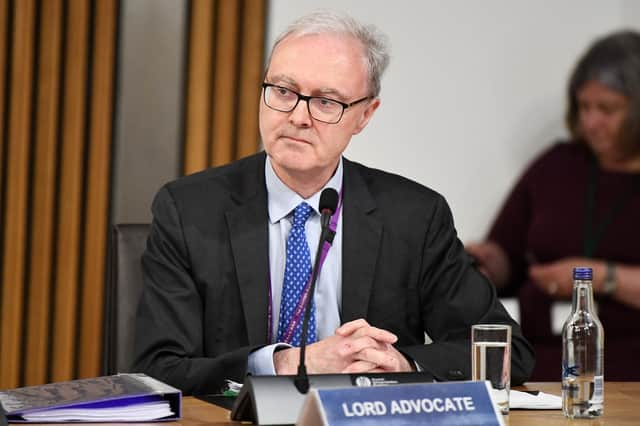It’s time to separate Lord Advocate roles


Yet this is not the case in Scotland. Lord Advocate James Wolffe is both the nation's most senior prosecutor as head of the Crown Office and can attend meetings of Nicola Sturgeon's Cabinet, where he provides the First Minister with legal advice.
The perceived conflict of interest this creates came to the fore during the Holyrood inquiry into the Scottish G overnment's botched handling of harassment allegations made against former f irst minister Alex Salmond.
Advertisement
Hide AdAdvertisement
Hide AdThe Crown Office was accused of being unhelpful and obstructive to the inquiry. It refused to hand over evidence until it was forced to and issued several threats of potential prosecution to Mr Salmond over evidence he wished to present.
Giving evidence in March, Lord Wolffe refused to say whether the Scottish government's failure to hand over evidence as demanded by a search warrant would constitute a criminal offence. He told MSPs: "I am not going to make any comment in the abstract on what might or might not be a criminal offence." This seems an extraordinary statement for Scotland's most senior prosecutor to make.
He denied any political influence in Mr Salmond's criminal prosecution and it may be the case that he was not leant upon by politicians throughout the affair. But with the position of Lord Advocate muddied by being both judicial and political, the suspicion will linger that he was indeed politically influenced.
Lord Wolffe's resignation announced yesterday should be an opportunity to rectify an anomaly in how Scotland is run. He should be replaced by two people, one who advises the Scottish Government on legal matters and another who heads the Crown Office.
The next legal adviser in Ms Sturgeon's Cabinet will have a crucial role in assessing the competence or otherwise of the Scottish G overnment's proposed referendum bill. The next head of the Crown Office will determine whether any prosecutions should be brought over the unlawful suppression of information that revealed the true scale of Covid-related deaths in care homes. It would make no sense for these two roles to remain conflated.